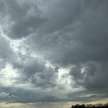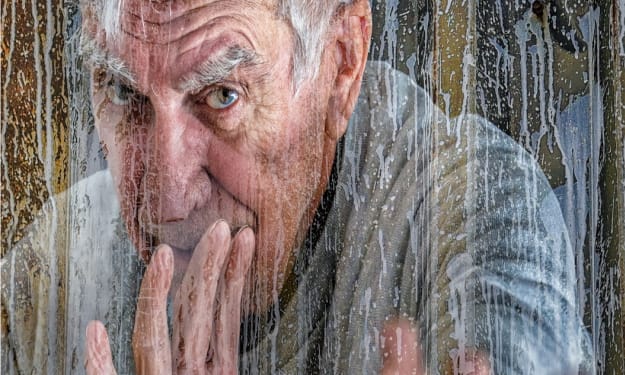The Ashen Grave
Drown us deep and dark.

In vain fall the lost… drown us in their cries. Drown us deep and dark… beneath their mangled lies.
Uttering thus, she moved forward, a figure drenched in moonlight. The shadows cast upturned lines on her face, neither parallel to the earth nor becoming of any natural laws. They bounced like the reveries of a crooked midnight fever, dancers summoned from unknown time. She did not create the shadows. She could not rip them from her features. And yet they trailed, just as her voice did, onto the canoe boards and apart from reality.
The river was dark. It churned with the ashes of the dead. Beneath, shale cluttered the ground and slept in uneven beds. Were one not cautious, a slip of footing might occur, ever rash along the skeletal surface. Shale would stir about and graze at the feet, leaving traces of blood in the forsaken waters and doom descending for many a year. The one would remain scarred, for a wound like such would never heal. Society, thus viewing the gray etches in their ankles come spring, would leave them shunned and looted. Status along the Murk came from purity, and those whom malady disgraced seldom lingered on.
With a groan, the canoe accepted the woman. Her rhythm swayed and spasmed in the movement, but her chant remained the same. Others followed, settling into canoes of their own. The chant bounced along them in delicate intervals, loudest with the woman and cascading backwards into oblivion. As her body lowered into the nook at the canoe’s back, she dipped a hand into the river. It came out parched and blackened. The substance previously coated still glinted underneath, as she knew it would, and hoped. She smiled then, pressing the smoky liquid against her tongue. Drown us, the others continued, as her voice broke off. Drown us, deep and dark.
They floated along the river at a gentle pace, in need of no oars but the current which bore them. Some stood, habiliments billowing behind, their twisted forms making mockery of the surrounding forest. Lanterns hung from the canoes’ fronts, but none were lit. It was a parade of indomitable silence, save for the wind and the chant so carried.
At the first bend, the woman’s voice burst forth anew. She kept her hands clasped before her, unmoving. The substance between formed webs in the cold, hardening along the journey just as her voice melted the air. It was a fire, her voice, rich and frightening. The edges of each line curled up like wilting petals. She charred the land with her song, and standing there, she savored its destruction.
The next bend neared. Smaller rivers poured into the one, carrying a chorus of identical canoes that bobbed sullenly through the night. These figures’ cloaks were colorless and tattered. Converging with the woman and her followers, they uplifted the chant.
Ever weaken the lost, mortals reaped and sowed. Their tongues suffice for soundless fears, while ours of grace belay their end. Drown us in the demons’ throes, as we sought and as we know. Drown us…. Drown us…. Drown us!
Upon the final uttering an echo of souls pressed into the air, thickening the words and the heat coursing through the river’s heart. The aura they had constructed laid aflame. It burned at the height. Now creatures fled from the forest, by the thousands and down to the valleys beyond. The river was widening, and the figures were aware. They watched the tension curl mutely about, up the trees’ spindly trunks and along the shale bed. Encircling the canoes’ path as it did so, the fire at last collided at the edge, revealing in horrific golden light the lake and the village upon.
The canoes were not guided as they reached the Murk. As if by some ethereal wont, they carried the figures in soft arcs throughout the lake. Reeds which had for some time brushed the canoes’ undersides now drew back and into the depths. The water’s surface grew icy; mist crept through the village’s center and vanished into the fiery halo. In this area, the shale was no longer visible; only the most ancient of water-dwellers could touch it, and even then, they had not the eyes to decipher it from the corpse-ridden land beyond.
Slowly, the woman drew herself from her canoe’s arms. Her notes fell into a feverish tone, and as the floating structures passed by, it became clear that the sole audience was the woman herself. She stepped onto the wooden ramp, peeling her hands apart and placing one on the bony post. It rocked under her weight but did not relent.
Behind her, the figures chanted faster, louder. They floated through the village on their ebony steeds. Their lips could be heard brushing as the song continued, and their breath held the beautiful, metallic taste of lightning amidst a storm. Then with a jolt their canoes hit the ramps’ sides. Countless now, all garbed in the colorless robes, boarded the village and opened their stride. Still their movements were silent, to the onlooker but a rustling of shadow in the fray. And yet there was a phantasmagoric appearance to the parade which no titles of reality could illustrate. They were irregular in themselves, and that was the horror indeed.
The woman advanced. Shards of wood pierced her bare soles, darkening the lake with fresh blood. She paid the pain no mind, for it did not exist. Since the malady, it never had.
Winding roads and arches swept past. The route was old, ancient. She could trace it at the end of ends, were her bones brittle and the light in her eyes extinguished. In memory, she could feel the lightness of her feet, the crisp teal of the lake as it glimmered in the sun. Such echoes had receded now. The past was lost, and in oblivion laid the map to her soul.
A crunch sounded under her feet. Then another while the road continued. She walked on, bearing the burden of blood that leeched through the panels. Accustomed to suffering were the creatures of the deep; let them come now, she thought, and open their jaws for the feast.
Suddenly there came a sharp turn, and by the time her bleached hair settled from the movement, she was upon it. Placed against the memories of the past, the door had grown haunting in appearance. Dry and gnarled it stood, withered at the bottom from flood and nailed thrice to hold. It had been a rich aspen hue once. She remembered opening it silently when she arrived, in awe of the rare color. The door was the last connection she had to her life before. It was there when she was pulled to the gates, and at the end when she stole herself away. She had been the only subject with one, and that is what lent her surety now. The rest had been given slots, many so tight that one had to enter bent at the knees. They had all of them been ignorant, pried apart like insects to be tossed come morn. Sometimes she had pounded at its surface with hands, screaming as the malady sunk into her flesh. Often she could hear the cries of the others rippling off the lake. And every breath, they watched. Like the ashes of the dead below, they remained.
In a swift, practiced stroke, she unbolted the door. The chant had heightened such in her deliberation that it thrummed inside her ears. Where sound was not, it added voice to her movements and wrote actions in the mist. No grace of the earth could contain her power. She was unlike any vision to be witnessed, ever gentle, desolate, and macabre. Upon a glance, it might appear she was fading, borne up from the wind. Drops of blood came and went. The moonlight shone through the flickering air. The figures stilled in their paths, each fixed in their fated pose. And when the sickened ones took hold together, releasing the pressure and the fire of the chant, the mortals didn’t even have time to wake.
With a shattering crash, the village planks ruptured skyward. Debris clouded the lungs and the land, and the figures with their captives in arm tumbled down into the ashen abyss. Ice coursed past. The deep and the dark stretched closer, faster. The mortals screamed in their hold, relentlessly battering the figures’ rigid forms. But still they sank, and the lowly surface dwindled. Time stretched on.
Gradually, the canoes and the village followed their bearers. Like ebony diamonds they rained down in the depths. The sun of the fire streamed beside them, reaching and pulling for its creators. Yet all throughout, the figures never moved. They refused to loosen their grasp.
The lake sucked them further, to the bottom and the edges of the world. The water clogged their vessels now. They couldn’t breathe.
Hundreds of them there were, each whose past and reason had vanished to time. Their lifeless prizes were adornments, the village which sank around them a forest on the lakebed. They rested there, alone but for each other. Far above and upstream, the mortal lands reeled and whispered of the witches. They watched as the fire overtook the port, over the canopy and down to its ebony canoes. Long-forgotten names were spat like poison. When they reached the Murk, they did not even attempt to save what remained. The horror and those who’d unveiled it could crumble into their own bloody curse. For them, it was folly to aid.
At last while the edges of the Murk touched the bed, and the witches opened their second mouths to breathe, the matter between their fingers disintegrated into the lake. It trickled away, united once again. A pallid world of gray.
The figures, the mutations, the witches – they smiled.
And in that abyss of shale, they began to feast.
About the Creator
Bridget Couture
An aspiring author and poet with an unquenchable love for books. Can often be found typing intensely or substituting reading for sleep.






Comments
There are no comments for this story
Be the first to respond and start the conversation.